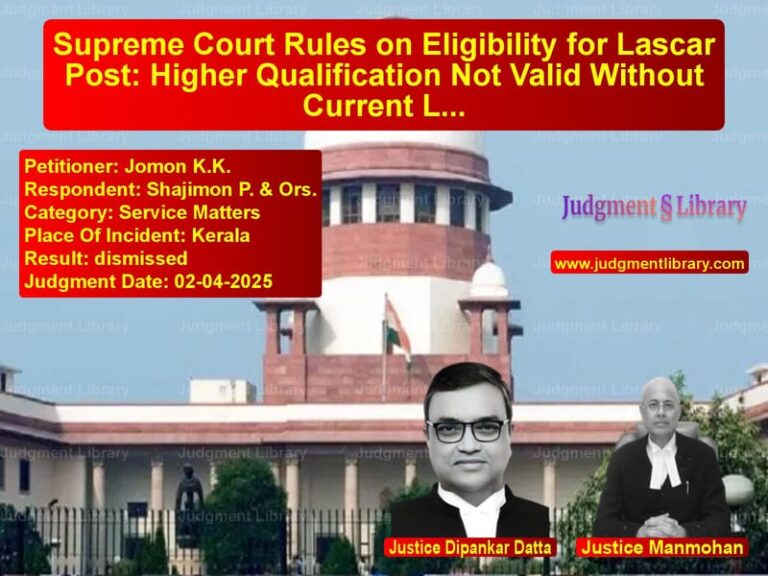Supreme Court Modifies Sentence in Assault Case After Settlement
The Supreme Court of India, in its judgment in Naresh vs. The State of Madhya Pradesh, addressed a criminal appeal concerning the sentence imposed under Section 325 of the Indian Penal Code (IPC) for voluntarily causing grievous hurt. The Court took note of the settlement between the parties and modified the appellant’s sentence to the period already undergone.
Background of the Case
The appellant, Naresh, was convicted under Section 325 IPC by the trial court and sentenced to one year of imprisonment along with a fine of ₹3,000. The conviction was upheld by the High Court of Madhya Pradesh, Bench at Gwalior, on May 11, 2017. Aggrieved by the decision, the appellant filed a Special Leave Petition (SLP) No. 910/2018 before the Supreme Court.
The case progressed as follows:
- The trial court convicted Naresh under Section 325 IPC and sentenced him to one year of imprisonment.
- The High Court upheld the conviction and sentence.
- The appellant approached the Supreme Court, citing the settlement between the parties and seeking a reduction in sentence.
Key Legal Issues Considered
- Whether the sentence imposed under Section 325 IPC could be modified based on a settlement between the parties.
- Whether the appellant’s sentence should be reduced in light of the National Lok Adalat’s decision in the counter-case.
- Whether the punishment should be limited to the period already undergone.
Arguments by the Appellant (Naresh)
- The appellant contended that the complainant had entered into a settlement with him, and there was no pending law and order issue.
- He argued that in a counter-case involving the same incident, Munnalal (the accused in that case) was awarded a lighter sentence of imprisonment till the rising of the court in the National Lok Adalat.
- The appellant requested that a similar approach be taken in his case, considering the settlement.
Arguments by the Respondent (State of Madhya Pradesh)
- The State did not oppose the settlement but emphasized that the conviction under Section 325 IPC was upheld by both the trial court and the High Court.
- The prosecution argued that the Supreme Court should exercise caution when modifying criminal sentences based on settlements.
Supreme Court’s Observations
The Supreme Court noted the settlement and acknowledged that both parties had resolved their differences. The Court observed:
“The parties have settled their disputes, and there is no law and order problem in the area.”
It further observed:
“In the counter-case, the first accused, who had also been sentenced to one year imprisonment under Section 325 IPC for the same incident, was given a lighter sentence of imprisonment till the rising of the court in the National Lok Adalat.”
Final Judgment and Directions
- The Supreme Court modified the appellant’s sentence, limiting it to the period already undergone.
- The Court ordered the release of the appellant if he was not required in any other case.
- The conviction under Section 325 IPC remained, but the punishment was reduced considering the settlement.
Implications of the Judgment
This ruling has significant implications for criminal sentencing in cases where parties reach an amicable settlement:
- Judicial Recognition of Settlements: Courts may consider reducing sentences if parties have resolved their disputes.
- Precedent for Sentence Modification: The ruling aligns with the trend of reducing sentences in non-serious criminal cases when the victim and accused reach a settlement.
- Fairness and Consistency in Sentencing: The Court ensured fairness by granting the appellant the same benefit given to the accused in the counter-case.
- Relief from Lengthy Litigation: The ruling saves judicial time and allows individuals to move on from minor disputes.
Conclusion
The Supreme Court’s decision in this case ensures fairness in sentencing by considering settlements between parties. By modifying the sentence to the period already undergone, the Court balanced legal principles with practical considerations. This judgment reinforces the importance of judicial discretion in modifying sentences based on the facts of each case.
Petitioner Name: NareshRespondent Name: The State of Madhya PradeshJudgment By: Justice Kurian Joseph, Justice Mohan M. ShantanagoudarJudgment Date: 15-02-2018
Don’t miss out on the full details! Download the complete judgment in PDF format below and gain valuable insights instantly!
Download Judgment: Naresh vs The State of Madhya Supreme Court of India Judgment Dated 15-02-2018.pdf
Direct Downlaod Judgment: Direct downlaod this Judgment
See all petitions in Bail and Anticipatory Bail
See all petitions in SC/ST Act Case
See all petitions in Judgment by Kurian Joseph
See all petitions in Judgment by Mohan M. Shantanagoudar
See all petitions in partially allowed
See all petitions in Modified
See all petitions in supreme court of India judgments February 2018
See all petitions in 2018 judgments
See all posts in Criminal Cases Category
See all allowed petitions in Criminal Cases Category
See all Dismissed petitions in Criminal Cases Category
See all partially allowed petitions in Criminal Cases Category







